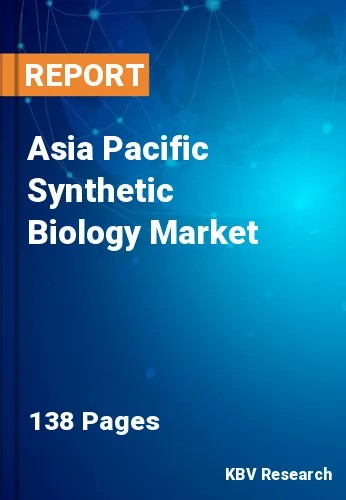The Asia Pacific Synthetic Biology Market would witness market growth of 19.6% CAGR during the forecast period (2023-2030).
In agriculture, synthetic biology enhances crop yield, improves disease resistance, and develops bio-based alternatives to traditional pesticides. The food industry leverages synthetic biology to produce ingredients, flavors, and nutritional components, contributing to creating sustainable and innovative food products. Developing crops with enhanced disease resistance is a critical focus of synthetic biology in agriculture. Researchers strive to minimize chemical interventions and reduce crop losses by introducing genes that confer resistance to pests, pathogens, and diseases. This approach is consistent with sustainable and environmentally friendly agricultural practices.
Additionally, emerging from the realm of synthetic biology are bio-based substitutes for conventional pesticides. Compounds produced by engineered microorganisms and plant variants can serve as deterrents against pests or disrupt their life cycles. Adopting this methodology enables the reduction of chemical pesticides' ecological footprint and fosters a more sustainable strategy for pest control. The application of synthetic biology principles aids in the advancement of precision agriculture methodologies.
China's R&D efforts in synthetic biology often focus on biomedical applications, including gene editing, personalized medicine, and regenerative therapies. This aligns with the global trend of using synthetic biology to address healthcare challenges. China has launched national research programs specifically targeting synthetic biology. Thus, growing R&D expenditure and biofuel investments in the Asia Pacific can help expand the regional synthetic biology market.
The China market dominated the Asia Pacific Synthetic Biology Market by Country in 2022, and would continue to be a dominant market till 2030; thereby, achieving a market value of $3,056.3 million by 2030. The Japan market is registering a CAGR of 18.8% during (2023 - 2030). Additionally, The India market would exhibit a CAGR of 20.4% during (2023 - 2030).
Free Valuable Insights: The Global Synthetic Biology Market is Predict to reach $46.7 Billion by 2030, at a CAGR of 18.7%
Based on End-use, the market is segmented into Biotechnology and Pharmaceutical Companies, Academic and Government Research Institutes, and Others. Based on Product, the market is segmented into Oligonucleotide/Oligo Pools and Synthetic DNA, Enzymes, Cloning Technologies Kits, Xeno-Nucleic Acids, and Chassis Organism. Based on Technology, the market is segmented into PCR Technology, NGS Technology, Genome Editing Technology, Bioprocessing Technology and Others. Based on countries, the market is segmented into China, Japan, India, South Korea, Singapore, Malaysia, and Rest of Asia Pacific.
By Application
By End-use
By Product
By Technology
By Country
Our team of dedicated experts can provide you with attractive expansion opportunities for your business.

